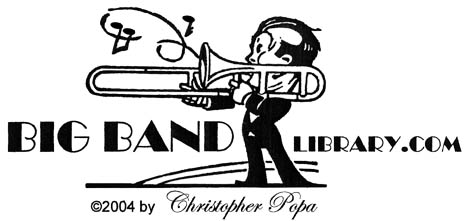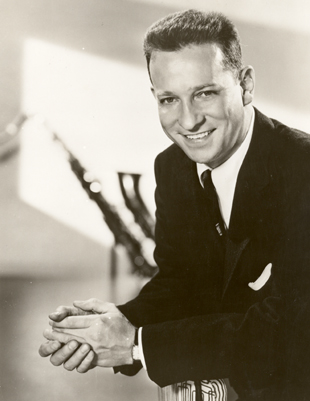
vital stats:
given name Samuel Koontz Donahue
birth Mar. 18, 1918, Detroit, MI
death Mar. 22, 1974, Sparks, NV, cancer
wife Patricia, b.1928?, m.1946, div.Dec. 22, 1954
children two
military service U.S. Navy, 1942-45 and 1951
memberships Local 5, American Federation of Musicians, Detroit, MI; Local 802, American
Federation of Musicians, New York City
residence Van Nuys, CA (early 1950s); 312 N. M St., Lake Worth, FL (1960s)
Donahue's big bands recorded between 1940 and 1947 for, variously, Okeh, Bluebird, Hit, and Capitol. Though collectors today enjoy such sides as It Counts a Lot, recorded December 26, 1940 and featuring a guest pianist, Count Basie, the general public back then put several of Donahue's records into the top 10, including I Never Knew, My Melancholy Baby, The Whistler, A Rainy Night in Rio, and Just the Other Day.
Musicians with Donahue's band included, at various times, Fern Caron and Ernie Bernhardt, trumpets; Eddie Bert, Tak Takvorian, Kenny Trimble, and Dick Nash, trombones; and Billy Cronk, bass.
Besides leading his own groups, Donahue was heard as a sideman in a variety of others' ensembles from the 1930s into the 1970s. He performed with Gene Krupa (1938-40) and with Artie Shaw Shaw's Navy Band (1942-44). When Shaw was discharged in February 1944, the band continued under the leadership of Donahue and was transferred to the European Theatre of Operations using their own, new music library. Donahue was recalled by the Navy in 1951, to reorganize the band department at their School of Music. Once done with that assignment, he returned to civilian life and worked as a sideman in Tommy Dorsey's band (1952), as director of a touring Billy May Orchestra (1954-56); and with Stan Kenton (1960).
Between 1954 and 1958, Donahue made several LPs under his own name, including "For Young Moderns in Love" (Capitol T-613), "Dance Date with Sam Donahue" (Remington R-199-249), and "Listen to Sam Donahue" (Prescott LP3001).
Also, he took part in recording sessions for at least three Everest LPs made in 1958, "Woody Herman: The Herd Rides Again...in Stereo" (SDBR 1003), "P.S., Tony Pastor Plays and Sings Shaw" (SDBR 1031), and "Larry Clinton: My Million Dollar Sellers" (SDBR 1096).
Donahue was also on various recordings made for RCA Victor in 1958-59, "The Big 18: Live Echoes of the Swinging Bands" (LSP-1921), "The Will Bradley-Johnny Guarnieri Band: Live Echoes of the Best in Big Band Boogie" (LSP-2098), and some sides made by Buddy Morrow (One, Two, Three Kick - Parts I and II / Don't Fret / Preachin' / Ambrosia).
In October 1961, Donahue was appointed as leader of the Tommy Dorsey Orchestra, which had been reconstituted a couple years after Tommy died in 1956. As the foundation of a new touring package, "The Music of Tommy Dorsey Lives On," Donahue and the Dorsey Orchestra initially featured trumpeter Ziggy Elman, Larry O'Brien as trombone soloist, and Billy Raymond (who had worked with Dorsey) and Jeannie Thomas on vocals.
The Orchestra's first album, a collection of Dorsey's hits newly-recorded in September 1962, was never released and not long afterwards the tour line-up was revamped. Most significantly, Frank Sinatra Jr. replaced Raymond as male vocalist with Donahue and the Dorsey Orchestra, making his professional singing debut with them at Dallas Memorial Theater in Texas in 1963. Also, Charlie Shavers replaced Elman; the current incarnation of The Pied Pipers vocal group was added; and Helen Forrest (who had never worked with Dorsey) was signed for additional nostalgic value.
RCA Victor tried again, recording the Orchestra and its stars as heard "Live At the Royal Band Box, Hotel Americana" (RCA Victor LSP-2830), though I'll Never Smile Again, taped September 22, 1963 with a vocal by Sinatra Jr. and The Pied Pipers, was rejected. In fact, the LP didn't include anything by Sinatra Jr. Another RCA Victor album by Donahue and the Dorsey Orchestra, "Music From The Broadway Hit 'Hello, Dolly'" (LSP-2916), was an all-instrumental, studio disc.
Meanwhile, in-person, the Orchestra gained attention with Sinatra, Jr., and there were TV appearances on "The Ed Sullivan Show" in September 1963 and January 1964, at the World Jazz Festival in Japan during the summer of 1964, and a tour of South America in June 1965. Following a return trip to the Orient, the "Tommy Dorsey" name was dropped.
Another album, "Frank Sinatra Jr.: Love for Sale," was made for Sinatra Sr.'s Reprise label (catalog no. RS 6178) in 1965, with the band billed as the "Sam Donahue Orchestra."
The group was downsized to an octet in 1966.
Still a respected instrumentalist, Donahue finished his career serving for a short time as musical director at the Playboy Club in New York City, then from 1969-on as leader of the house band in the Circus Room of the Nugget Hotel in Sparks, NV (just east of Reno).
Looking back on his musical career and life on the road, it brings to mind the lyrics of an old song, "There's something calling me from way out yonder, it's just the gypsy in my soul!
. . . There is no other life, of which I'm fonder, it's just the gypsy in my soul!"
sources:
Ernie Edwards Jr., "Jazz Discographies Unlimited" Presents Big Bands Vol. Five
(Whittier, CA: Erngeobil Publications, 1967).
Leonard Feather, The New Edition of the Encyclopedia of Jazz (New York City: Horizon
Books, 1960), p.183.
---, The Encyclopedia of Jazz in the Sixties (New York City: Horizon Press, Inc., 1966),
p.109.
---, The Encyclopedia of Jazz in the 70s (New York City: Horizon Press Publishers Ltd.,
1976), p.122.
Charles Garrod, Sam Donahue and His Orchestra (Zephyrhills, FL: Joyce Record Club,
1992.
---, Tommy Dorsey and His Orchestra: Volume Two 1946 - 1956 (Zephyrhills, FL: Joyce
Record Club, [ n.d. ]).
Roland Taylor, "Sam Donahue Dies in Nevada," [ Glenn Miller Society ] Moonlight
Serenader, Number 130 Volume 20 / Apr. 1974, p.2.
Joel Whitburn, Joel Whitburn's Pop Memories 1890-1954: The History of American Popular
Music (Menomonee Falls, WI: Record Research, Inc., 1986), pp.128-129.
"Wife Divorces Band Leader Sam Donahue," Los Angeles Times, Dec. 23, 1954, p.2.
John S. Wilson, "Dorsey Band at the Americana Recalling Sounds of the Forties; Mixture of
'Ghost' Show and the Real Thing Includes Even a Frank Sinatra," New York Times,
Sept. 12, 1963, p.34.
I would like to expand this tribute with, if possible, a new interview of someone who was important to Sam Donahue's life or career. Are you an alumnus of his band, a member of his family, or a collector who is knowledgeable about his accomplishments? Please contact me via e-mail
return to "Biographical Sketches" directory
go to Big Band Library homepage
The big bands are back
in a new and exciting way!
SAM DONAHUE
"NO OTHER LIFE
OF WHICH I'M FONDER"
by Music Librarian CHRISTOPHER POPA
April 2009
He began his musical career at the age of 9, studying clarinet, saxophone, and trumpet - eventually developing into an excellent tenor saxophonist.
While in school, he was offered his first professional job, at a newly-legalized beer garden in River Rouge, MI, about 6-1/2 miles southwest of his hometown.
He liked playing music and, later, enjoyed being on the road - even to the point of choosing that life over going home to his spouse, who threatened to divorce him.
Donahue led his own orchestras during several periods, most notably in 1940-42, 1946-48, and 1957-59 (including appearances at Birdland and The Blue Note jazz clubs in New York City during 1957).
